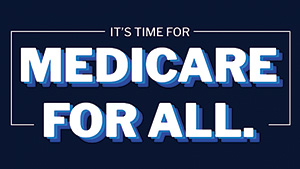 In the months since the coronavirus struck, our economy has been devastated. More than 1.54 million people have confirmed COVID-19 cases. And more than 90,608 Americans have died as a result.
In the months since the coronavirus struck, our economy has been devastated. More than 1.54 million people have confirmed COVID-19 cases. And more than 90,608 Americans have died as a result.
“With the jobless tally rising quickly by the millions, as businesses struggle to keep people employed during the pandemic, the absurdity of having our health care linked to jobs becomes painfully clear,” said John Schmitt, vice president of the Economic Policy Institute (EPI).
EPI research determined 16.2 million Americans have likely lost their health care due to pandemic job losses. Linking health insurance to employment has always been problematic. The pandemic is highlighting and exacerbating those issues. Medicare for All, while a hugely ambitious policy undertaking, could be one way to remedy this situation.
“In addition to ensuring people have health coverage — an essential goal during a global pandemic — EPI’s research has determined a Medicare-for-all type health care plan could boost wages, help create jobs and lead to more efficient labor markets that better match jobs and workers,” Schmitt said.
MEDICARE FOR ALL
EPI’s research shows that Medicare for All would help not hurt the labor market, and would ensure when people lose their job, they still would have access to health care.
More than 33 million Americans have already lost their job since the COVID-19 pandemic derailed our economy, leaving millions of families wondering how they will pay the bills—and what they will do now for health care.
Comprehensive reforms to our health care system would ensure everyone has access to quality care, independent of their job.
MEDICAID EXPANSION
In Missouri, a group of Missouri doctors and Medicaid expansion advocates on May 1 submitted more than twice as many signatures from Missourians as required to put the initiative directly before voters in November.
If approved, Medicaid expansion will help keep rural hospitals open, deliver billions in economic stimulus and help hundreds of thousands of hardworking Missourians, who have jobs that don’t come with insurance, get access to life-saving care.
That includes Missourians on the frontlines of the coronavirus outbreak, working essential, low-wage jobs in grocery stores, as delivery drivers, in nursing homes, hospitals and elsewhere.
They and others who would benefit fall into what is known as a coverage gap, often earning too much to qualify for Medicaid and too little to afford private insurance.

